The Guernsey Jew who hid from the Nazis in plain sight – BBC News
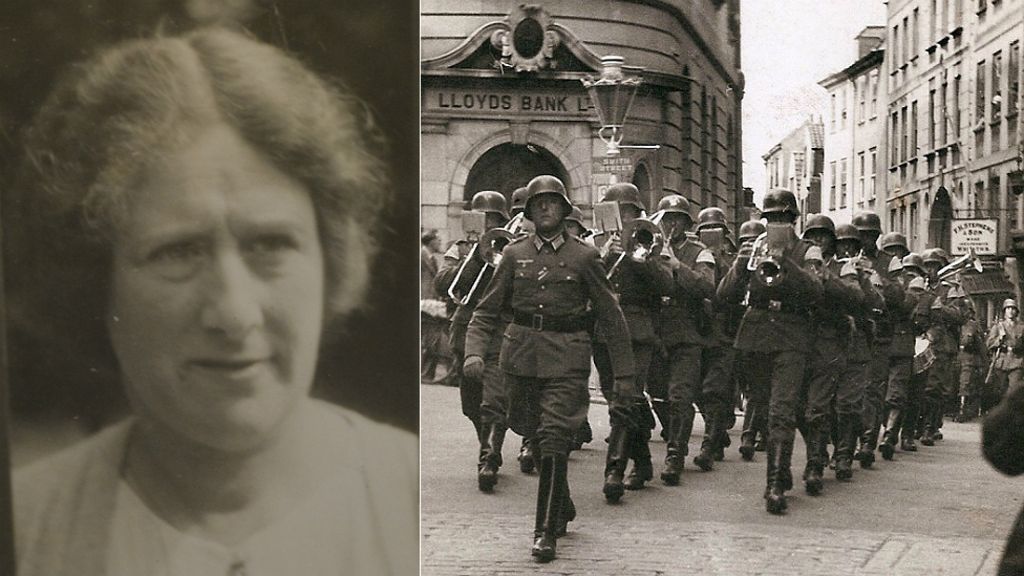
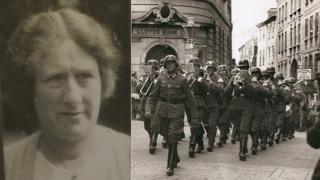 Image copyright Guernsey Archives/BBC
Image copyright Guernsey Archives/BBC Being Jewish in the German-occupied Channel Islands during World War Two meant a life of misery at best and, for three women, death. Now, after more than 70 years, the BBC can reveal one Jewish woman hid in plain sight from the Nazis in Guernsey. It seems likely she was protected by a senior member of the island’s government who was possibly her lover.
Miriam Jay lived in Guernsey during the five-year occupation of the Channel Islands.
Many Jews left ahead of the occupation, but Ms May stayed to maintain the house of her wealthy stockbroker employer.
She lived in the St Peter Port property with a lawyer who was involved in writing the Nazis’ anti-Semitic policies into law. Those who have studied her story now believe that man was her partner and protector.
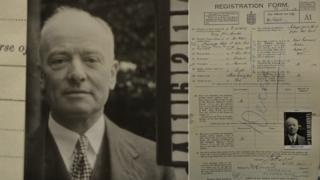 Image copyright Guernsey Archives
Image copyright Guernsey Archives Advocate George Ridgway was Her Majesty’s Solicitor General in Guernsey from 1935 until March 1942.
German identity card registration forms show he lived with Ms Jay at two separate addresses in St Peter Port before his death.
During the same period he was involved in registering four of the nine anti-Jewish laws implemented on the island.
Guernsey Occupation Museum curator Richard Heaume believes Mr Ridgway was in a dilemma, knowing Ms May was Jewish.
“It’s extraordinary, quite extraordinary,” he said. “He was living a very difficult life.
“He was living together with her for several years. It wasn’t just a housekeeper-tenant relationship; it was a very close relationship.”
In October 1940 he presented the first law targeting the islands Jews, stating those did not make themselves known to the authorities would face a fine or imprisonment.
If Ms Jay had been found out, she would have risked deportation, internment and death. However, her secret remained safe.

Risks of hiding
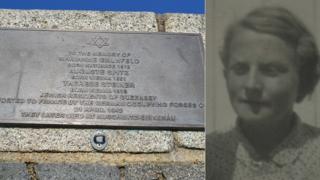 Image copyright BBC/Guernsey Archives
Image copyright BBC/Guernsey Archives Hiding your Jewish religion in Guernsey was a dangerous game, as the wartime experiences of Marianne Grunfeld bear out.
Like Ms Jay, the Polish farm worker failed to declare she was a Jew when required under the first registration order, which was passed in October 1940.
The German occupying forces were, however, made aware of her Jewish origins and deported her to France.
By the end of the war she was dead, perishing at Auschwitz along with fellow Guernsey deportees Therese Steiner and Auguste Spitz.

Stephen Regal, from the Channel Islands Jewish Community, said it was “astounding” that someone senior in Guernsey’s government may have knowingly sheltered a Jew on the island.
“I think that Advocate Ridgway definitely put himself at risk if he knowingly obscured her past, bearing in mind of course he couldn’t even plead ignorance to the law because he was one of the officers tasked reluctantly to promulgate Nazi law within Guernsey.”
Following his death from illness in 1942, his funeral at St James’ Church was a grand affair with senior islanders attending and, as the local paper reported, the mourners were led by his older brother and his “personal friend” Ms Jay.
Had Mr Ridgway been protecting his partner? Mr Heaume believes it was “quite likely” they were a couple.
“George was single and I know before the war George Ridgway had a lady friend down at Petit Bot and when that lady evacuated to England he was at a loss for a partner so to speak,” he said.
“Then in 1942 with the stress of doing both roles of Attorney General and Solicitor General he needed help and obviously, the comfort of Miriam Jay was a great blessing.”

Guernsey anti-Jewish laws
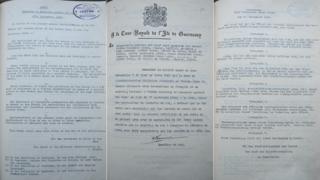 Image copyright Guernsey Archives
Image copyright Guernsey Archives - October 1940 – Jews must make themselves known to the authorities including “those who belong or have belonged to the Jewish religion, or who have more than two Jewish grandparents”
- November 1940 – All Jewish business interests must be declared
- June 1941 – Redefined the definition of Jewish as those with at least three Jewish grandparents, or two grandparents of “pure” Jewish blood and prohibited Jews and Jewish-owned business from carrying out many activities
- October 1941 – Administrators of Jewish undertakings should on the termination of their management, transfer the proceeds to the Department of Finance of Economics (Jersey)
- March 1942 – Established an 08:00-18:00 curfew, decreeing that Jews were no longer able to change place of residence without consent. For the first time the penalty of non-compliance included the line “the offender may be interned in a camp for Jews”
- May 1942 – Again redefined who was deemed to be Jewish – “two grandparents of ‘pure’ Jewish blood” – and said those under the new definition would not be allowed to listen to wireless radios
- June 1942 – Jews more than six years of age must at all times wear a six-pointed yellow star. The stars were ordered but had not arrived by the time of deportations in February 1943 and so were never worn in the islands
- August 1942 – Banned Jews from public places of entertainment, restricted shopping hours to 15:00-16:00
- January 1943 – Jews with German nationality living abroad had to forfeit their nationality and their assets were seized. This is only thought to have applied to a single German Jew living in Jersey, Margarete Hurban. Similar measures were later registered relating to Polish, Bohemian and Moravian Jews

Ms Jay had been born in London and grew up in a Jewish family.
She moved to Guernsey in 1932 and changed her surname from the Jewish-sounding Jacobs in 1937 – at a time when anti-Semitism was on the rise.
After her wartime experience, she returned in the 1960s to Essex where she spent the remainder of her life.
Her great-nephew Dennis Baum said he thought being in the occupied islands must have been “horrendous and frightening” for her.
She “never spoke about her time in Guernsey to the family”, he said, and he was “intrigued and mystified how she managed to survive”.
Mr Baum said he had conflicting emotions, feeling “pride and sadness – sadness that we’ll never know the true story and pride that she was yet another survivor… of what was five years of hell”.
He described her as a generous and kind woman who gave her time and money to the Jewish Ex-Servicemen’s Association, but was always reserved.
“She was very much more an English lady than the rest of the family, the rest of the family were much more Essex people.”
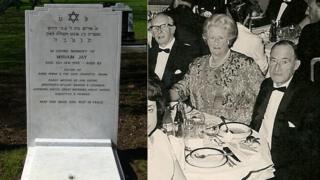 Image copyright Dennis Baum
Image copyright Dennis Baum Read more: http://www.bbc.co.uk/news/world-europe-guernsey-38744583